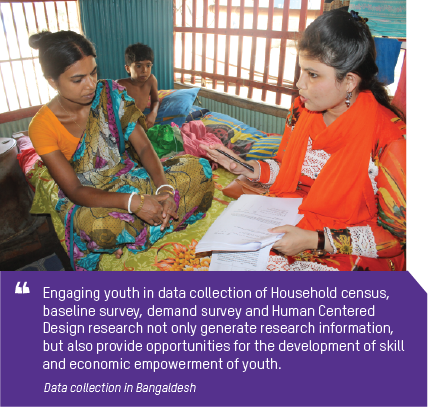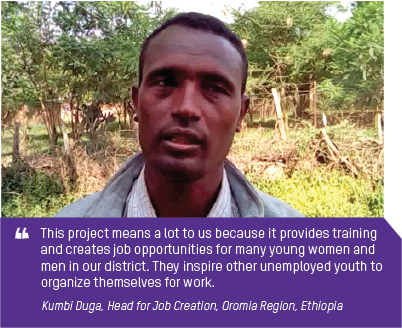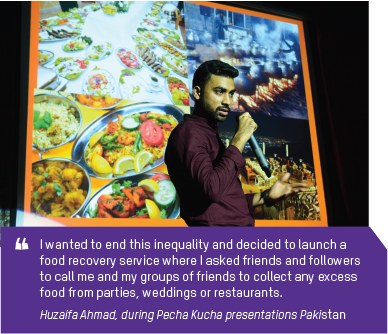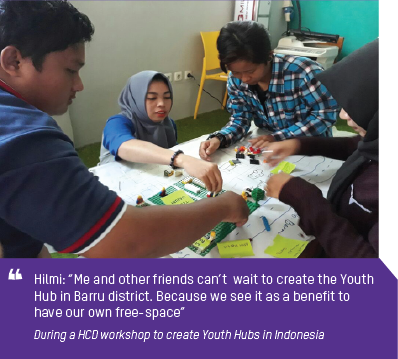Update
We would like to give you an update on the Empower Youth for Work project, where we will focus on what has been achieved the first quarter of year 2. In all countries, baseline surveys have been conducted, collaboration with governments established and youth groups are formed and becoming active in their communities. On August 12, we celebrated International Youth Day. In all 4 countries hundreds of youth, policy-makers, government members, social enterprisers, young entrepreneurs, private sector, academia and media gathered to inspire and to trigger change. Please read below about the key results in each of the countries and the key challenges we are facing in the project in the period April – June 2017.
key results
Bangladesh:

- A Memorandum of Understanding about the Access to Information (a2i) programme with the Prime Minister's Office. Through this partnership, collaboration for co-creation of programme activities will be improved.
- Engaging youth in research and data collection.
- Village level youth groups are connected at regional level through existing Youth Apex Bodies at union level and district advisory boards.Youth are starting to take on responsibilities and engage with community members. Some have started their own social initiatives, such as coaching children in schools.
- A training module on skills and knowledge for active citizenship. About 500 youths received training.
- The interest and ownership of young people is high. Youth are designing their own action plans and influencing initiatives, for example a literacy campaign.
Ethiopia:

- Development of training modules by the Federal Technical and Vocational Education and Training (TVET) Agency, including experts from government, private sector and youth representatives.
- A comprehensive assessment on gender based violence, barriers to sexual and reproductive health services and unpaid care work by an external consultant, with involvement of stakeholders at all levels. Findings will be used to conduct evidence-based sensitization and influencing activities.
- A partnership agreement with well-known mass media company Fana Broadcasting Corporate to deliver sensitisation and influencing work, including broadcasting radio programs and wider support.
- A rapid assessment to identify the needs of youth and the demand by employers.
Pakistan:

- A Memorandum of Understanding between Sindh Agriculture University, Tandojan and Implementing partner College of Youth Activism and Development (Cyaad).
- Collaboration of implementing partner Bargad, Organization for Youth Development with Special Monitoring Unit of Chief Minister Punjab.
- Engagement of religious leaders and their commitment to support project interventions.
- Testing of Social Norms Diagnostic Tool in project implementation areas.
- Kick-off of collaboration with Human Centred Design partner White Rice.Prototype testing started after co-creation phase of HCD.
Indonesia:

- A Climate Change Exhibition, including a talk show about the impact of climate change for youth in rural coastal areas.
- The celebration of International Youth Day about youth dialogue on early marriage. Nine young people shared a Pecha Kucha presentation and over 400 people attended the event offline.
- Roll out change catalyst mini workshop series, which improved awareness of youth about the urgency and potential strategies to change stereotypes on care and domestic responsibilities at household level.
- The Barru district government stated they will support the EYW project by providing support for building youth hubs.
- AKVO online platform tools for data collection are in place and ready to be used for youth mapping. EYW partners are trained to use the data collection tool.
key Challenges
All four countries are facing some challenges and risks. Key challenges include delays in activities and progress, including delays in the start of pilots. Other challenges relate to difficulties reaching the number of women targeted. Besides that, challenges relate to opportunities for young women and young girls, such as few employment opportunities available for young women as many jobs are not considered “women-friendly” in Bangladesh, and in Pakistan young girls are not aware of business and job opportunities, and have have limited or no access to internet. Moreover, challenges relate to the interests of youth, such as limited interest in entrepreneurship opportunities in Bangladesh, and in Indonesia young men are more interested in economic activities rather than participating in the Gender Action Learning System.
